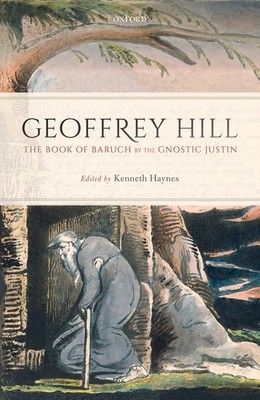
- We will send in 10–14 business days.
- Author: Geoffrey Hill
- Publisher: Oxford University Press, USA
- Year: 2019
- ISBN-10: 0198829523
- ISBN-13: 9780198829522
- Format: 15.5 x 23.6 x 2.3 cm, hardcover
- Language: English
- SAVE -10% with code: EXTRA
Reviews
Description
At his death in 2016, Geoffrey Hill left behind The Book of Baruch by the Gnostic Justin, his last work, a sequence of more than 270 poems, to be published posthumously as his final statement. Written in long lines of variable length, with much off-rhyme and internal rhyme, the verse-form of the book stands at the opposite end from the ones developed in the late Daybooks of Broken Hierarchies (2013), where he explored highly taut constructions such as Sapphic meter, figure-poems, fixed rhyming strophes, and others. The looser metrical plan of the new book admits an enormous range of tones of voices.
Thematically, the work is a summa of a lifetime's meditation on the nature of poetry. A riot of similes about the poetic art makes a passionate claim for the enduring strangeness of poetry in the midst of its evident helplessness. The relation between art and spirituality is another connecting thread. In antiquity, Justin's gnostic Book of Baruch was identified as the 'worst of heresies, ' and the use of it in Hill's poem, as well as the references to alchemy, heterodox theological speculation, and the formal logics of mathematics, music, and philosophy are made coolly, as art and as emblems for our inadequate and perplexed grasp of time, fate, and eternity. A final set of themes is autobiographical, including Hill's childhood, the bombing of London, his late trip to Germany, his alarm and anger at Brexit, and his sense of decline and of death close at hand. It is a great work, and in Hill's oeuvre it is a uniquely welcoming work, open to all comers.EXTRA 10 % discount with code: EXTRA
The promotion ends in 20d.17:01:01
The discount code is valid when purchasing from 10 €. Discounts do not stack.
- Author: Geoffrey Hill
- Publisher: Oxford University Press, USA
- Year: 2019
- ISBN-10: 0198829523
- ISBN-13: 9780198829522
- Format: 15.5 x 23.6 x 2.3 cm, hardcover
- Language: English English
At his death in 2016, Geoffrey Hill left behind The Book of Baruch by the Gnostic Justin, his last work, a sequence of more than 270 poems, to be published posthumously as his final statement. Written in long lines of variable length, with much off-rhyme and internal rhyme, the verse-form of the book stands at the opposite end from the ones developed in the late Daybooks of Broken Hierarchies (2013), where he explored highly taut constructions such as Sapphic meter, figure-poems, fixed rhyming strophes, and others. The looser metrical plan of the new book admits an enormous range of tones of voices.
Thematically, the work is a summa of a lifetime's meditation on the nature of poetry. A riot of similes about the poetic art makes a passionate claim for the enduring strangeness of poetry in the midst of its evident helplessness. The relation between art and spirituality is another connecting thread. In antiquity, Justin's gnostic Book of Baruch was identified as the 'worst of heresies, ' and the use of it in Hill's poem, as well as the references to alchemy, heterodox theological speculation, and the formal logics of mathematics, music, and philosophy are made coolly, as art and as emblems for our inadequate and perplexed grasp of time, fate, and eternity. A final set of themes is autobiographical, including Hill's childhood, the bombing of London, his late trip to Germany, his alarm and anger at Brexit, and his sense of decline and of death close at hand. It is a great work, and in Hill's oeuvre it is a uniquely welcoming work, open to all comers.

Reviews